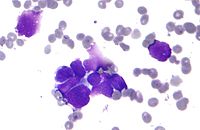
Discovery of a Secalonic Acid Derivative from Aspergillus aculeatus, an Endophyte of Rosa damascena Mill., Triggers Apoptosis in MDA-MB-231 Triple Negative Breast Cancer Cells
Sign Up to like & getrecommendations! Published in 2020 at "ACS Omega"
DOI: 10.1021/acsomega.0c02505
Abstract: A new secalonic acid derivative, F-7 (1), was isolated from the endophytic Aspergillus aculeatus MBT 102, associated with Rosa damascena. The planar structure of 1 was established on the basis of 1D and 2D NMR… read more here.
Keywords: acid derivative; microscopy; rosa damascena; aspergillus aculeatus ... See more keywords

Investigation on the chemical constituents of the marine-derived fungus strain Aspergillus brunneoviolaceus MF180246.
Sign Up to like & getrecommendations! Published in 2022 at "Natural product research"
DOI: 10.1080/14786419.2022.2144300
Abstract: Aspergillus have been proven to be excellent resources for new natural products. During our systematic biodiversifying new compounds from marine derived fungi, one novel compound, asperbrunneo acid (1), along with seven bistetrahydroxanthone analogues, secalonic acid… read more here.
Keywords: aspergillus brunneoviolaceus; brunneoviolaceus mf180246; derived fungus; acid ... See more keywords

A Sensitive Ultra-performance Liquid Chromatography-Tandem Mass Spectrometric Method for Determination of Secalonic Acid F in Rat Plasma and Its Application to Pharmacokinetic Study.
Sign Up to like & getrecommendations! Published in 2023 at "Journal of chromatographic science"
DOI: 10.1093/chromsci/bmad030
Abstract: Secalonic acid F (SAF) is a fungal secondary metabolite exhibited interesting pharmacological effect. In this study, a simple and sensitive ultra-performance liquid chromatography-tandem mass spectrometric (UPLC-MS/MS) method was developed and validated for the determination of… read more here.
Keywords: sensitive ultra; secalonic acid; ultra performance; method ... See more keywords

Secalonic acid- F inhibited cell growth more effectively than 5-fluorouracil on hepatocellular carcinoma in vitro and in vivo.
Sign Up to like & getrecommendations! Published in 2017 at "Neoplasma"
DOI: 10.4149/neo_2017_304
Abstract: Hepatocellular carcinoma (HCC), one of the most common types of liver cancer, could be treated with 5-fluorouracil (5-FU). Due to its side effects, 5-FU is more often used as the co-administration drug in clinical practice.… read more here.
Keywords: hepatocellular carcinoma; carcinoma; cell growth; inhibited cell ... See more keywords